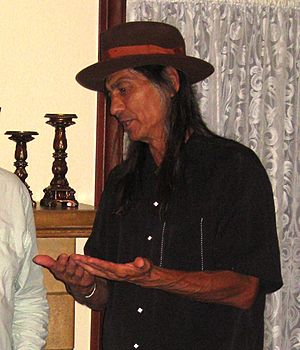Richard Ray Whitman facts for kids
Quick facts for kids
Richard Ray Whitman
|
|
|---|---|

Richard Ray Whitman, 2010
|
|
| Born | 1949 (age 76–77) Claremore, Oklahoma, U.S.
|
| Nationality | Muscogee (Creek) Nation, American |
| Education | Institute of American Indian Arts |
| Known for | Acting, Photography, mixed-media, film, painting |
|
Notable work
|
Street Chiefs |
Richard Ray Whitman, born in 1949, is a talented artist, poet, and actor. He is a member of the Yuchi and Muscogee peoples. He creates art using many different forms, like painting, photography, and video. Richard Ray Whitman lives in Oklahoma.
Contents
Early Life and Learning
Richard Ray Whitman was born in Claremore, Oklahoma, in 1949. His grandmother was Polly Long. Like many Yuchi people, he is part of the Muscogee (Creek) Nation. He grew up in a place called Gypsy, Oklahoma.
He went to Bristow High School. After that, he studied art at several schools. These included the Institute of American Indian Arts and the California Institute of the Arts. He also learned photography at the Oklahoma School of Photography.
His Artistic Journey
Richard Ray Whitman started his art career as a painter. Over time, he began to work with photography, art installations, and video art. In 1973, he was part of a significant event at Wounded Knee. During this time, when Native Americans were standing up for their rights, he created art.
Photography Work
Whitman is well-known for his black-and-white photographs. These pictures show what life is like for Native people today. One of his most famous collections is the "Street Chiefs Series" from the 1970s and 1980s.
The "Street Chiefs" photos show Native men who were experiencing homelessness. Most of these pictures were taken in downtown Oklahoma City. Whitman wanted to show the real lives of these individuals. He felt it was important to share their stories, including the challenges they faced. His photos show great kindness and understanding for these people. They also connect their experiences to the larger history of Indian Removal. This was when many tribes were forced to leave their homes and move to places like Indian Territory.
Since the 1980s, Whitman has added words and computer graphics to his photos. This creates a mixed-media style. His art often explores important social and political topics. He frequently focuses on themes of homeland and being forced from one's land.
Video and Acting
Richard Ray Whitman has also worked with video. He teamed up with his brother, Joe Dale Tate Nevaquaya, who is a Yuchi poet. Together, they made videos to help document and preserve the Yuchi language. In the 1990s, they worked with a French filmmaker named Pierre Lobstein.
Whitman also read poetry by T.C. Cannon in a video called "Mazerunner: The Life and Art of T.C. Cannon." This video was shown at the Metropolitan Museum of Art. It was also broadcast on TV channels like Bravo and the Independent Film Channel.
Movies and TV Shows
Richard Ray Whitman is also an actor. He has appeared in many movies and television shows.
Movies
| Year | Title | Role |
|---|---|---|
| 1988 | War Party | Harold |
| 2003 | American Indian Graffiti: This Thing Life | Barry |
| 2006 | Rune | Tecpatel |
| 2007 | Four Sheets to the Wind | Frankie Smallhill |
| 2007 | Missionary Man | Chief Dan |
| 2009 | The Only Good Indian | Father of stolen child |
| 2009 | Barking Water | Frankie |
| 2013 | Winter in the Blood | John First Raise |
| 2013 | The Cherokee Word for Water | Roger |
| 2014 | Drunktown's Finest | Harmon, John |
| 2016 | Neither Wolf Nor Dog | Grover |
| 2021 | Oklahoma Mon Amour | Lloyd |
| 2021 | Montford: The Chickasaw Rancher | Joe Carlton |
| 2022 | The Unknown Country | Grandpa August |
| 2024 | Jazzy | Grandpa August |
Television Shows
| Year | Title | Role | Notes |
|---|---|---|---|
| 1994 | Lakota Woman: Siege at Wounded Knee | Carter Camp | TV movie |
| 2019 | Chambers | Harrison Yazzie | 3 episodes |
| 2021–2022 | Reservation Dogs | Old Man Fixico | 5 episodes |
See Also
 | Leon Lynch |
 | Milton P. Webster |
 | Ferdinand Smith |

